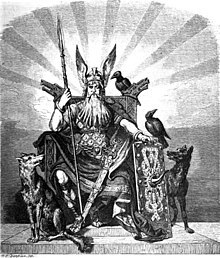God the Father
![]()
Gottvater is a redirect to this article. For other meanings, see God the Father (disambiguation).
God the Father or God the Father (also: God the Father, God the Father, the Father of Jesus Christ, the Father) is the name given in Christianity to the first hypostasis of God (YHWH) in its relationship to the second hypostasis, Jesus Christ, who is called the Son of God. In non-Trinitarian branches of Christianity, YHWH is usually identified only with the Father and not with the Son (or the Holy Spirit as the third hypostasis).
In the Tanakh, in other writings of Judaism and in Jewish prayer YHWH is addressed and called (my, our) "Father". This means above all his action as the creator of the world turned towards mankind and as the merciful sustainer of his chosen people. With this Judaism stands in contrast to polytheistic religions, which worshipped a "father of the gods" as the main deity of a pantheon or a divine triad (trinity), a male "father of heaven" opposite a female "mother of the earth", or a human god-king (Pharaoh) as "father" of his subjects. In this sense, according to Jewish tradition, all humans are sons and daughters of God, (divine) persons are not worshipped, and Ruach HaQodesh (the Holy Spirit, literally "Holy Breath") is not elevated to the status of a god.
Christology teaches that Jesus Christ took up this tradition by addressing God confidentially, in the Aramaic language, as Abba ("Papa") and teaching his disciples the Lord's Prayer. The early Christians referred to YHWH as "Father of Jesus Christ," emphasizing his identity with the covenant God of the Israelites. Therefore the expression "God the Father (Jesus Christ)" took the place of the name of God in Christianity.
Following this use of language in the New Testament (NT), the Christian doctrine of the Trinity describes God's being in the three divine persons of the Father, the Son and the Holy Spirit. Tertullian introduced the Latin neologism "trinitas." The early church dogmatized the doctrine of the Trinity in the 4th century in order to preserve the unity and uniqueness of God of the Christian Bible. In doing so, it excluded as heresies Christian trends that sought to separate the Creator God of Israel from the Redeemer God of Jesus (Marcion, Gnosticism, Docetism). The early church creeds and most Christian denominations hold to the doctrine of the Trinity.
Extrabiblical analogies
Egyptian mythology knew a primordial deity who was paraphrased with a variety of attributes, including "father of gods" (... and goddesses/ and men) in the sense of a theogony ("the one who generates the one who generates him").
Greek mythology often called the chief god Zeus "father" to express his supreme authority over gods and men. He was not thought to be a creator. The title appears in Homer's two major works, the Iliad and the Odyssey, primarily as a direct address to Zeus. This attribute of rulership passed to the chief god of Roman religion named Jupiter (from iu- for "day," "bright," and pater for "father").
The Germanic mythology of the Edda knew a "god-father" or "father-god" Tyr. His name, like the names Zeus and Jupiter, is etymologically traced to the Indo-Germanic sky-god Dyaus Pita. His attributes later passed to the main Germanic deity Odin (Wodan).
Some images of gods from the Ancient Near East show features that are interpreted as indications of a "father god": a beard, seated position and a "kalathos" basket as headgear. For example, the marble sculpture of a god's head from the Roman imperial period has these features, which, in the absence of other typical indications, has been interpreted to mean Amun, Asclepius, Jupiter, Neptune, Saturn, or Serapis. Serapis was similarly depicted on coins of the Ptolemaic period in Alexandria. It is assumed that such images inspired the later idea of God as a bearded, wise old man.
The pantheon of Ugarit knew beside the main god El also a related El-ib. It is unclear whether this title is to be interpreted as a genitive "god of the father" (of the ancestor of a Semitic clan) or as an apposition "god-father" (deified ancestor). This is thought to be a prefiguration of the "God of the Fathers" who appears in the Archfathers stories of the Bible (Gen 12-50). El was also referred to in Ugarit as "creator of heaven and earth," "king," "father," and "maker of gods." Abraham, the progenitor of Israel, transferred the creator attribute to his God YHWH according to Gen 14:22 EU.

Carl Emil Doepler: Odin, the father of the gods (painting from 1880)
Judaism
For the month of the Jewish calendar, see Aw (month).
The word Av or Ab (Heb., singular אָב, "Av", plural אבות , "Avot" or "Abot") means "father" in the Hebrew language. As Adonai (Hebrew אֲדֹנָי ădonāy "my Lord"), it is one of the circumlocutions for YHWH to express high regard. Modern Ivrit in Israel today uses the word אבא abba. Av or Ab occurs as part of names, e.g. Ab-ram, Av-i-ram, Ah-ab, Jo-ab.
The mishnatraktat "Sayings of the Fathers" (Heb. פרקי אבות Pirqe Avot) in the Nesikin order of the Talmud deals with ethical and moral principles.
The Aramaic term abba (אבא, father) appears in traditional Jewish liturgy and in Jewish prayers to G'tt, e.g., the Kaddish (Aramaic קדיש 'holy' or 'sanctification').
.jpg)
Communal Kaddish prayer in Jerusalem to commemorate the dead at the grave
Search within the encyclopedia